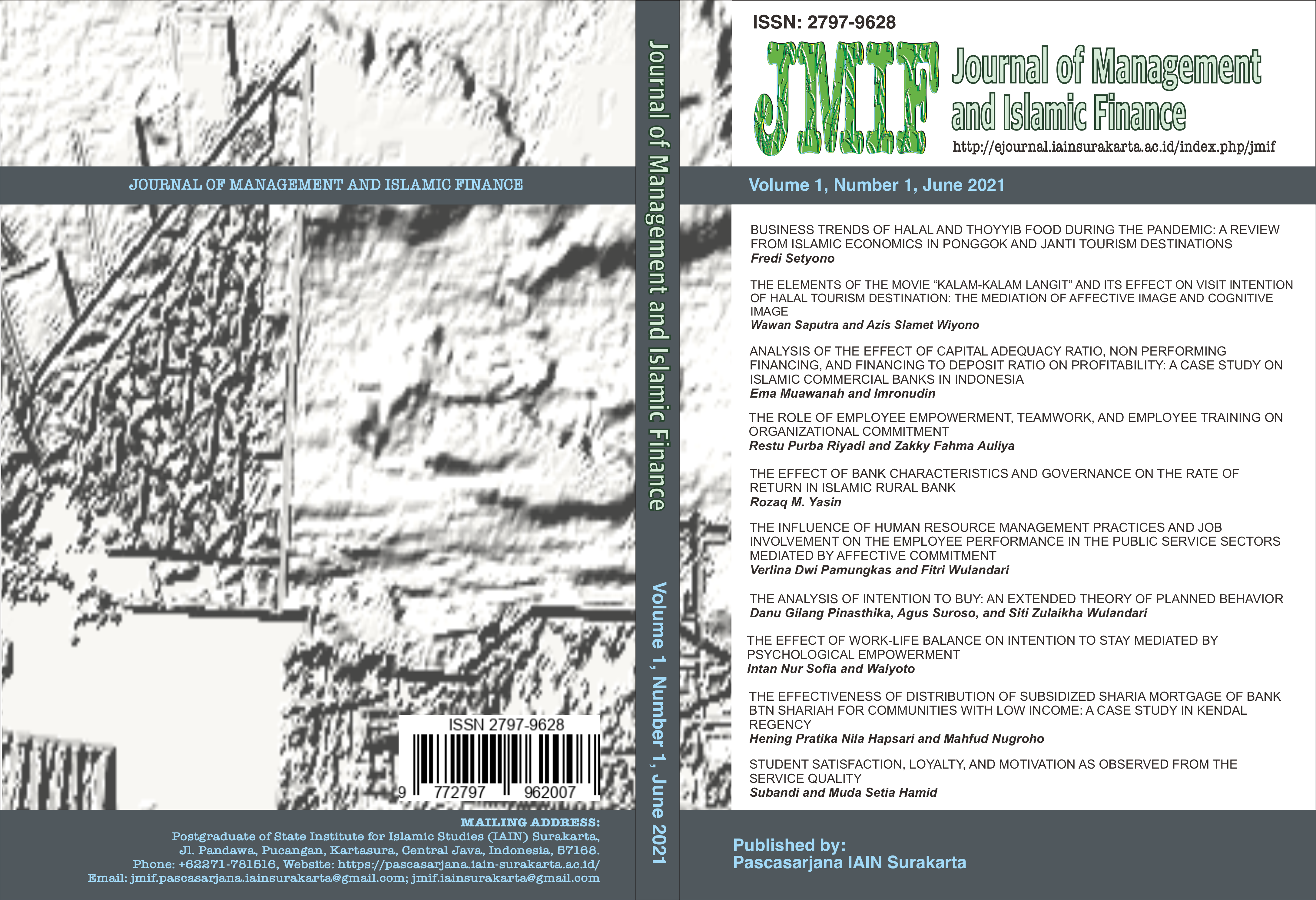BUSINESS TRENDS OF HALAL AND THOYYIB FOOD DURING THE PANDEMIC: A REVIEW FROM ISLAMIC ECONOMICS IN PONGGOK AND JANTI TOURISM DESTINATIONS
DOI:
https://doi.org/10.22515/jmif.v1i1.3567Abstract
The purpose of this study is to explore the trends of the halal food business as well as the problems they encounter at hard times and whether they can survive in the current conditions. This study used qualitative research methods through interviews with several food sellers in Ponggok and Janti tourism destinations. The study shows that sellers at Ponggok and Janti, Klaten have been running a halal food business for Islamic economic review. In running their business, sellers sell halal food, not gharar and maysir. However, there are still sellers who did not use the financing and services of the Islamic financial institutions to run their business, some are still using conventional banks to run their business. Hence, it is very difficult for them to have halal certification. During the Covid-19 pandemic, sellers have dropped their sales turnovers resulting in no profit.
Downloads
References
Afandi, Y. (2009). Fiqh Muamalah dan Implementasinya dalam Lembaga Keuangan Syariah.
Ardianto, Y. (2020). Memahami Metode Penelitian Kualitatif. In DJKN Kementerian Keuangan.
BPOM. (2020). Cek Produk BPOM RI. In www.cekbpom.pom.go.id.
Fatmasari Sukesti, & Mamdukh Budiman. (2014). the Influence Halal Label and Personal Religiousity on Purchase. International Journal of Business, Economics and Law, 4(1), 2012–2015.
Jaelani, A. K., Handayani, I. G. A. K. R., & Karjoko, L. (2020). Development of halal tourism destinations in the Era of regional autonomy in West Nusa Tenggara Province. International Journal of Innovation, Creativity and Change, 12(12), 765–774.
Janti, I. S. (2020). Peran Omotenashi Dalam Meningkatkan Makanan Halal Di Jepang. Sosiologi Reflektif, 14(2), 389–405.
Kemenhan, R. (2014). UU Nomor 33 Tahun 2014 Tentang Jaminan Produk Halal.
LPPOM. (2019). Sertifikasi Halal MUI Periode 2012-2019,. In www.halalmui.org.
Marzuki, I., & Ramdaniah, F. (2020). Strategi Pemasaran Pedagang Sembako Dalam Meningkatkan Taraf Ekonomi Perspektif Ekonomi Islam. Iqtishadia Jurnal Ekonomi Dan Perbankan Syariah, 6(1), https://10.19105/iqtishadia.v6i1.2139. https://doi.org/10.19105/iqtishadia.v6i1.2139
Musa, K. (2006). Ensiklopedi Halal-Haram dalam Makanan dan Minuman.
Nasrullah, A. (2018). Analisis Potensi Industri Halal Bagi Pelaku Usaha di Indonesia. At-Tahdzib Jurnal Studi Islam Dan Muamalah Kopertais 4, 50–78.
Nurohman, Y. A., & Qurniawati, R. S. (2019). Keputusan Pembelian Produk Makanan Halal Di Lingkungan IAIN Surakarta. Among Makarti, 12(24), 23–33.
Setiawan, S., & Mauluddi, H. A. (2019). Perilaku Konsumen Dalam Membeli Produk Halal Di Kota Bandung. At-Tijaroh: Jurnal Ilmu Manajemen Dan Bisnis Islam, 5(2), 232–246. https://doi.org/10.24952/tijaroh.v5i2.1849
Ulum, B. (2018). Implementasi Prinsip Ekonomi Islam Oleh Pedagang. 05, 381–396.
Wahyono, Z., & Razak, M. A. A. (2020). Islamic Tourism in Southeast Asia: The Concept and its Implementation. International Journal of Halal Research, 2(2), 90–105. https://doi.org/10.18517/ijhr.2.2.90-105.2020
Wan-Hassana, W. M., & Awangb, K. W. (2009). Halal food in New Zealand restaurants: An exploratory study. International Journal of Economics and Management, 3(2), 385–402.
Warto A.S. (2020). Bisnis Produk Halal antara Peluang dan Tantangan , Problematika dan Halal Product Business Between Opportunities and Challenges , Problematics and Their Solutions Bisnis Produk Halal antara Peluang dan Tantangan , Problematika dan Solusinya Author corresp. Al-Ulum, 20(1), 274–294.
Zahrah, A., & Fawaid, A. (2019). Halal Food di Era Revolusi Industri 4.0: Prospek dan Tantangan. Hayula: Indonesian Journal of Multidisciplinary Islamic Studies, 3(2), 121–138. https://doi.org/10.21009/hayula.003.2.01
Downloads
Published
Issue
Section
Citation Check
License
Authors who publish with this journal agree to the following terms:
- Authors retain copyright and grant the journal right of first publication with the work simultaneously licensed under a Creative Commons Attribution License that allows others to share the work with an acknowledgement of the work's authorship and initial publication in this journal.
- Authors are able to enter into separate, additional contractual arrangements for the non-exclusive distribution of the journal's published version of the work (e.g., post it to an institutional repository or publish it in a book), with an acknowledgement of its initial publication in this journal.
- Authors are permitted and encouraged to post their work online (e.g., in institutional repositories or on their website) prior to and during the submission process, as it can lead to productive exchanges, as well as earlier and greater citation of published work.






